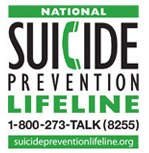According to the National College Health Assessment, 31% of students reported feeling so depressed it was difficult to function within past 12 months. Depression affects how people feel, think, and behave, and can significantly interfere with day-to-day activities and enjoyment of life. Depression is a serious concern. It isn’t something that one can simply "snap out of," nor is it a personal weakness. The good news is that most people who experience depression respond well to treatment.
Recognize
- Depressed, sad, or flat mood
- Tearful
- Diminished interest or pleasure in normal activities; withdrawal
- Changes in appetite or weight
- Difficulty sleeping or oversleeping
- Physical agitation or restlessness
- Sluggishness
- Fatigue or loss of energy
- Feelings of worthlessness or excessive/inappropriate guilt nearly every day
- Difficulty concentrating, remembering, making decisions
- Hopeless, pessimistic, negative
- Worthlessness, guilt, negative self-image
- Suicidal ideation, preoccupation with death or dying
Respond
- Share that you are concerned about the student and ask them how they are doing
- Give them space to talk and provide support
- Do not minimize what they are going through
- Do not diagnose or suggest medication
- Dial down your expectations and encourage them to set small goals to re-engage in activities. Provide support or company.
- Encourage them to engage in activity, however small, and direct attention outward, away from introspection
- If they express suicidal ideation, take it seriously, and seek professional support
- Encourage them to seek counseling or other support
Refer
On Campus (413-542-extension)
- Center for Counseling and Mental Health x2354 (confidential)
- Dean of Students Office x2337 or x2111 after hours
- Campus Police (if at risk of suicide) x2111
- Residential Counselors (RCs) and Area Coordinators (ACs)
